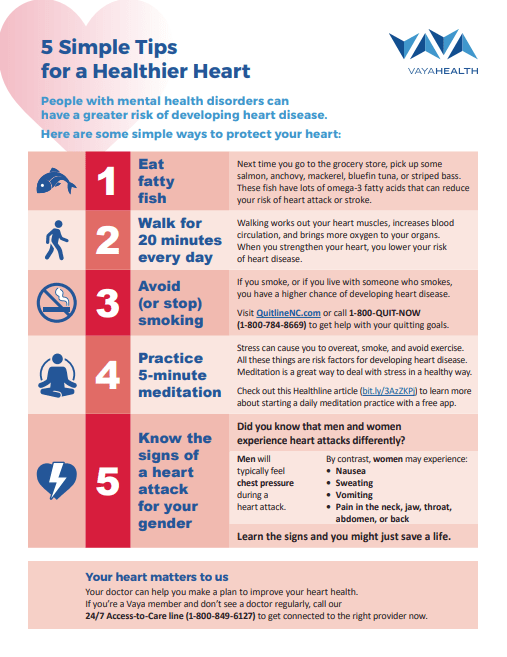People with mental health disorders can have a greater risk of developing heart disease. That’s why it’s critical that those facing these health challenges pay extra attention to their heart health. We spoke with Dr. Lorena Wade, Vaya Health’s Deputy Chief Medical Officer, to learn how we can all take better care of our hearts.
1. Eat fatty fish
Next time you go to the grocery store, pick up some fish to cook for dinner. We suggest choosing salmon, anchovy, mackerel, bluefin tuna, or striped bass. These fish have lots of omega-3 fatty acids that can reduce your risk of heart attack or stroke.
“Lean fish like catfish and mahi mahi don’t give you the same health benefits as fatty ones. However, they’re still a good source of lean protein,” said Dr. Wade.
2. Walk 20 minutes every day
“Walking is my favorite form of exercise to recommend to people. Almost all of us can do it. We don’t need fancy equipment or a huge time commitment. And just 20 minutes a day will get you to your weekly exercise goals,” Dr. Wade explained.
Walking is an aerobic exercise. It works out your heart muscles, increases blood circulation, and brings more oxygen to your organs. When you strengthen your heart, you lower your risk of heart disease.
3. Avoid (or stop) smoking
People with behavioral health challenges are more likely to smoke. And smoking is a huge risk factor for heart disease.
“Smoking also hurts the hearts of those we live with. Secondhand smoke causes nearly 34,000 deaths each year from heart disease,” Dr. Wade said.
If you smoke, or if you live with someone who smokes, you have a higher chance of developing heart disease. You can better protect your heart by avoiding nicotine smoke and/or quitting smoking yourself.
QuitlineNC is a great resource for people trying to quit smoking. Visit their website or call 1-800-QUIT-NOW (1-800-784-8669) to get help with your quitting goals.
4. Practice 5-minute meditation
When you’re constantly stressed, you’re more likely to overeat, smoke, and avoid exercise. All these things are risk factors for developing heart disease. However, meditation can be a great way to reduce stress.
“I like to call it a lifestyle addition,” Dr. Wade said. “Meditating regularly can lower your blood pressure and your need to take medications.”
Many meditation apps offer free guided meditations for beginners. Starting a daily meditation habit is easy. All it takes is five minutes of your time, a quiet space, and patience with yourself. Check out this Healthline article to learn more about meditation’s benefits and which app would be best for you.
5. Know the signs of a heart attack for your gender
Did you know that men and women experience heart attacks differently?
“Women are less likely to feel chest pain during a heart attack,” said Dr. Wade. It’s very important to know the heart attack symptoms for your gender, especially if you’re at risk for heart disease.
Men will typically feel chest pressure during a heart attack. By contrast, women may experience:
-Nausea
-Sweating
-Vomiting
-Pain in the neck, jaw, throat, abdomen, or back
Learn more about the differences in heart disease for men and women here.

Your heart matters to us
At Vaya, we want to support every part of your health journey. We know that some of these tips may be easier to follow than others—but that’s ok! Your doctor can help you make a plan to improve your heart health. If you’re a Vaya member and don’t see a doctor regularly, call our 24/7 Behavioral Health Crisis Line (1-800-849-6127) to get connected to the right provider now.



